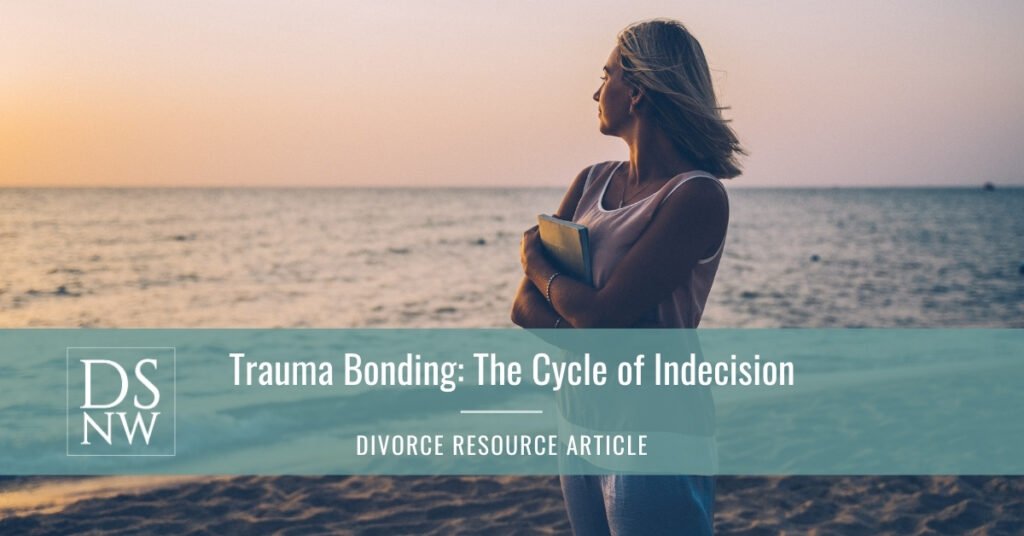
This subconscious bond distorts your reality and keeps you stuck.
You know the feeling well— the strong desire to leave, followed by the stronger pull to stay.
· You feel stuck and miserable, yet not strong enough to leave
· You strive to focus on the “good” in your partner
· Your tell yourself “no one is perfect”
· You make excuses for abusive behavior
· An inability to trust your partner and an inability to leave
· You believe that your partner can and will change, despite history to the contrary
· You hope that the relationship will get better in the future
· You defend your partner and the relationship
It’s like your trauma bond runs the show– because it does.
At first, you can’t see it at all. You have no idea trauma bonds even exist, much less that they grow stronger with each passing day. A trauma bond causes you to stay in an abusive relationship without seeing it for what it is, to stay in a known abusive relationship, and to grieve the loss of that abusive relationship after it has ended.
The trauma bond distorts your reality, deceives you into believing the “love” you feel from your partner is real, and drives you to tolerate anything to get more of it. The narcissist, consciously or subconsciously, creates a trauma bond.
And you give them power and control.
What creates a trauma bond?
The trauma bond, or attachment to an abusive partner, is created through repeated physical and/or emotional abuse and intermittent reinforcement. Unpredictability breeds uncertainty, shame and insecurity into your relationship and your household.
The narcissist uses intermittent reinforcement by offering rewards of attention, kind words, gifts, physical touch, or acts of service at irregular intervals. This causes you to stay with a partner you don’t fully trust. The rewards are specifically inconsistent and leave you constantly unsettled.
Here’s how it goes…
- The narcissist complains about the dinner you’ve made. It’s too hot, too cold, too dry, too watery, too bland, too spicy…
- Another night, they tell you they love your cooking, and they appreciate your efforts.
- You experience a surge of dopamine, epinephrine and norepinephrine– the “feel good hormones”.
- You continue to cook, in hopes of hearing those words and experiencing that chemical rush again (while subconsciously accept the resultant abuse).
Or…
- The covert narcissist is distant, shutting you out, stonewalling you… manipulating and controlling you.
- This goes on for weeks, even months, and you become determined to leave the relationship.
- The narcissist begs and pleads you to stay, saying they’ve been going through something, that it has nothing to do with you, that you deserve someone so much better than they can ever be, and that they’ll do everything possible to become that person, if only you will stay.
- “Please give me another chance.”
- You experience the hormone surge. This is the person you fell in love with…. this feels real.
- The next time they use the silent treatment to control you, you tolerate it even longer, with the hope that you can experience these feelings again.
- Each time it happens, you sink even lower…. you knew better! You are caught in an endless cycle of hope and heartbreak.
Eventually, if you can get past wondering if there is something wrong with you, you admit to yourself that something is very wrong with this relationship. The trauma bond’s existence is powerful and confusing. It leaves you in a vigilant state of unrest between despair and continually seeking the chemical high from the rare and yet powerful “rewards”. The trauma bond lasts…. until you break it.
Living this reality can feel paralyzing, but freedom is achievable. Survival takes strength.
Want help with this?
Your Trusted Partner
Whether you’re contemplating a divorce, have already started the process, or are far into the proceedings, do you wish you had someone to share with you the inside scoop on how to save money, time, and emotional energy on your divorce?
Our team is available for Support On-Demand to discuss the many scenarios, options, and implications of separation or divorce, via telephone or videoconference during this time. Feel free to get in touch with us; we are here for you!





[…] toxic cycle feels unending. A skilled therapist trained in Domestic Abuse can help you understand trauma bonding, the motives of an abuser, and can help you see things objectively. Akin to a lobster boiling in a […]